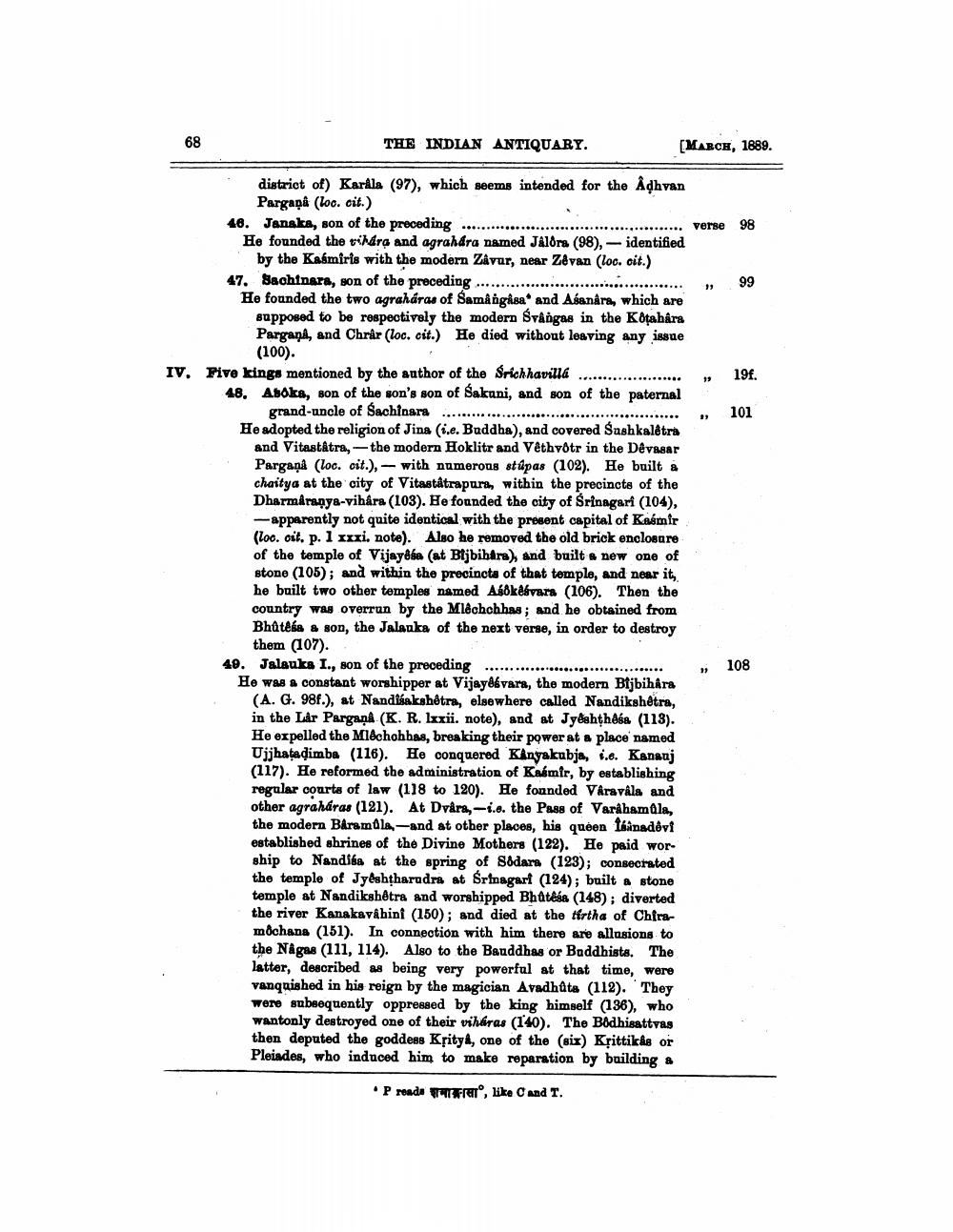________________
THE INDIAN ANTIQUARY.
[MARCH, 1889.
98
„
99
19f.
101
district of) Karála (97), which seems intended for the Adhvan
Pargana (loc. cit.) 48. Jangka, son of the preceding ........
......... verse He founded the vindra and agrahara named JAlora (98), - identified
by the Kasmiris with the modern Závur, near Zevan (loc. cit.) 47. Sachinara, son of the preceding ......... He founded the two agraháras of Samångåsa and Asanára, which are
supposed to be respectively the modern Svanges in the Kotahára Pargana, and Chrar (loc. cit.) He died without leaving any issue
(100) IV. Pive kings mentioned by the author of the Srichhaville ........
48. Aboka, son of the son's son of Sakani, and son of the paternal
grand-uncle of Sachinara ................................................. He adopted the religion of Jina i.e. Buddha), and covered Sashkaletra
and Vitastatra, -the modern Hoklitr and Véthyotr in the Devasar Pargañá (loc. cit.), - with numerous stúpas (102). He built a chaitya at the city of Vitastâtrapura, within the precincts of the Dharmiranya-vihára (103). He founded the city of Srinagari (104), - apparently not quite identical with the present capital of Kasmir (loo. oit. p. 1 xxxi. note). Also he removed the old brick enclosure of the temple of Vijay8sa (at Btjbibira), and built a new one of stone (105); and within the precincts of that temple, and near it, he built two other temples named Asokékvara (106). Then the country was overrun by the Mléchchhas; and he obtained from Bhatéka a son, the Jalauka of the next verse, in order to destroy
them (107). 40. Jalauka I., son of the preceding ........ He was a constant worshipper at Vijayavara, the modern Bijbihira
(A. G. 98f.), at Nandisakshetra, elsewhere called Nandikshếtra, in the Lar Pargana (K. R. lxxii. note), and at Jy&shtheba (118). He expelled the Mléchohbas, breaking their power at a place named Ujjhatadimba (116). He conquered Kanyakubja, 1.c. Kenanj (117). He reformed the administration of Kasmir, by establishing regular courts of law (118 to 120). He founded Våravals and other agraháras (121). At Dvåra, -i.e. the Pass of Varahamála, the modern BAramalan-and at other places, his queen Thanadovi established shrines of the Divine Mothers (122). He paid worship to Nandiba at the spring of Sodars (123); consecrated the temple of Jyéshțharudra at Srinagart (124); built a stone temple at Nandikshetra and worshipped Bhatéka (148); diverted the river Kanakavabini (150); and died at the tirtha of Chfram/chana (151). In connection with him there are allusions to the Någas (111, 114). Also to the Bauddhas or Buddhists. The latter, described as being very powerful at that time, were vanquished in his reign by the magician Avadhůta (112). They were subsequently oppressed by the king himself (136), who wantonly destroyed one of their viháras (140). The Bodhisattvas then deputed the goddess Krity, one of the (six) Krittikls or Pleiades, who induced him to make reparation by building
108
.P reada
Fre, like Cand T.




